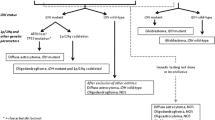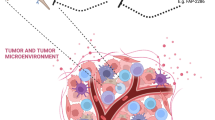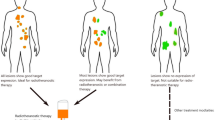Abstract
Background
Fluorescence-guided surgery with 5-aminolevulinic acid (5-ALA) enables more complete resections of tumors in adults. 5-ALA elicits accumulation of fluorescent porphyrins in various cancerous tissues, which can be visualized using a modified neurosurgical microscope with blue light. Although this technique is well established in adults, it has not been investigated systematically in pediatric brain tumors. Specifically, it is unknown how quickly, how long, and to what extent various pediatric tumors accumulate fluorescence. The purpose of this study was to determine utility and time course of 5-ALA–induced fluorescence in typical pediatric brain tumors in vitro.
Methods
Cell cultures of medulloblastoma [DAOY and UW228], cPNET [PFSK] atypical teratoid rhabdoid tumor [BT16] and ependymoma [RES196] were incubated with 5-ALA for either 60 minutes or continuously. Porphyrin fluorescence intensities were determined using a fluorescence-activated cell sorter (FACS) after 1, 3, 6, 9, 12 and 24 hours. C6 and U87 cells served as controls.
Results
All pediatric brain tumor cell lines displayed fluorescence compared to their respective controls without 5-ALA (p < 0.05). Sixty minutes of incubation resulted in peaks between 3 and 6 hours, whereas continuous incubation resulted in peaks at 12 hours or beyond. 60 minute incubation peak levels were between 52 and 91 % of maxima achieved with continuous incubation. Accumulation and clearance varied between cell types.
Conclusions
We demonstrate that 5-ALA exposure of cell lines derived from typical pediatric central nervous system (CNS) tumors induces accumulation of fluorescent porphyrins. Differences in uptake and clearance indicate that different application modes may be necessary for fluorescence-guided resection, depending on tumor type.


Similar content being viewed by others
References
Robertson PL (2006) Advances in Treatment of pediatric brain tumors. NeuroRx 3:276–291
Duffner PK, Cohen ME, Myers MH, Heise HW (1986) Survival of children with brain tumors: SEER Program, 1973–1980. Neurology 36:597–601
Regula J, MacRobert AJ, Gorchein A, Bounaccorsi GA, Thrope SM, Spencer GM, Hatfield AR, Bown SG (1995) Photosensitisation and photodynamic therapy of oesophageal, duodenal, and colorectal tumours using 5 aminolaevulinic acid induced protoporphyrin IX–a pilot study. Gut 36:67–75
Stummer W, Stocker S, Novotny A, Heimann A, Sauer O, Kempski O, Plesnila N, Wietzorrek J, Reulen HJ (1998) In vitro and in vivo porphyrin accumulation by C6 glioma cells after exposure to 5-aminolevulinic acid. J Photochem Photobiol B 45:160–169
Stummer W, Stocker S, Wagner S, Stepp H, Fritsch C, Goetz C, Goetz AE, Kiefmann R, Reulen HJ (1998) Intraoperative detection of malignant gliomas by 5-aminolevulinic acid-induced porphyrin fluorescence. Neurosurgery 42:518–525
Stummer W, Novotny A, Stepp H, Goetz C, Bise K, Reulen HJ (2000) Fluorescence-guided resection of glioblastoma multiforme by using 5-aminolevulinic acid-induced porphyrins: a prospective study in 52 consecutive patients. J Neurosurg 93:1003–1013
Díez Valle R, Slof J, Galván J, Arza C, Romariz C, Vidal C (2013) representación de los investigadores del estudio VISIONA, Observational, retrospective study of the effectiveness of 5-aminolevulinic acid in malignant glioma surgery in Spain (The VISIONA Study). Neurologia. doi:10.1016/j.nrl.2013.05.004
Feigl GC, Ritz R, Moraes M, Klein J, Ramina K, Gharabaghi A, Krischek B, Danz S, Bornemann A, Liebsch M, Tatagiba MS (2010) Resection of malignant brain tumors in eloquent cortical areas: a new multimodal approach combining 5-aminolevulinic acid and intraoperative monitoring. J Neurosurg 113:352–357
Pichlmeier U, Bink A, Schackert G, Stummer W, ALA Glioma Study Group (2008) Resection and survival in glioblastoma multiforme: an RTOG recursive analysis of ALA study patients. Neuro Oncol 10:1025–1034
Sanai N (2012) Emerging operative strategies in neurosurgical oncology. Curr Opin Neurol 25:756–766
Schucht P, Beck J, Abu-Isa J, Andereggen L, Murek M, Seidel K, Stieglitz L, Raabe A (2012) Gross total resection in contemporary surgery: results of an institutional protocol combining 5-aminolevulinic acid intraoperative fluorescence imaging and brain mapping. Neurosurgery 71:927–935
Stummer W, Pilchmeier U, Meinel T, Wiestler OD, Zanella F, Reulen HJ (2006) ALA-Glioma Study Group. Flourescence-guided surgery with 5-aminolevulinic acid for resection of malignant glioma: a randomized controlled multicentre phase III trial. Lancet Oncol 7:392–401
Stummer W, Reulen HJ, Meinel T, Pichlmeier U, Schumacher W, Tonn JC, Rohde V, Oppel F, Turowski B, Woiciechowsky C, Franz K, Pietsch T, ALA-Glioma study Group (2008) Extent of resection and survival in glioblastoma multiforme: identification of and adjustment for bias. Neurosurgery 62:564–576
Tonn JC, Stummer W (2008) Flourescence-guided resection of malignant gliomas using 5-aminolevulinic acid: practical use, risks and pitfalls. Clin Neurosurg 55:20–26
Eicker S, Sarikaya-Seiwert S, Borkhardt A, Gierga K, Turowski B, Heiroth HJ, Steiger HJ, Stummer W (2011) ALA-induced Porphyrin Accumulation in Medulloblastoma and its use for Fluorescence-Giuded Surgery. Cen Eur Neurosurg 72:101–103
Ruge JR, Liu J (2009) Use of 5-aminolevulinic acid for visualization and resection of benign pediatric brain tumor. J Neurosurg Pediatr 4:484–486
Beez T, Sarikaya-Seiwert S, Steiger HJ, Hänggi D (2014) Fluorescence-guided surgery with 5-aminolevulinic acid for resection of brain tumors in children—a technical note. Acta Neurochir 156:597–604
Preuß M, Renner C, Krupp W, Christiansen H, Fischer L, Merkenschlager A, Kieß W, Müller W, Manzo N, Meixenberger J, Nestler U (2013) The use of 5-aminolevulinic acid flourescence guidance in resection of pediatric brain tumors. Childs Nerv Syst 29:1263–1267
Keles GE, Berger MS, Srinivasan J, Kolstoe DD, Bobola MS, Silber JR (1995) Establishment and characterization of four human medulloblastoma-derived cell lines. Oncol Res 7:493–503
Ota S, Crabbe DC, Tran TN, Triche TJ, Shimada H (1993) Malignant rhabdoid tumor. A study with two established cell lines. Cancer 71:2862–2872
Bobola MS, Silber JR, Ellenbogen RG, Geyer JR, Blank A, Goff RD (2005) O6-mathylguanine-DNA methyltransferase, O6-benzylguanine, and resistance to clinical alkylators in pediatric primary brain tumor cell lines. Clin Cancer Res 7:2747–2755
Van Vuurden DG, Hullemann E, Meijer OLM, Wedekind LE, Kool M, Witt H, Vandertop PW, Würdinger T, Noske DP, Kaspers GJ, Cloos J (2011) PARP inhibition sensitizes high grade glioma, medulloblastoma and ependymoma to radiation. Oncotarget 2:984–996
Stummer W, Tonn JC, Goetz C, Ullrich W, Stepp H, Bink A, Pietsch T, Pilchmeier U (2014) 5-Aminolevulininc acid-derived tumor flourecsence: the diagnostic accuracy of visible fluorescence qualities as corroborated by spectrometry and histology and prospective imaging. Neurosurgery 74:310–320
Rudin CM, Hann CL, Laterra J, Yauch RL, Callahan CA, Fu L, Holcomb T, Stinson J, Gould CB, LoRusso PM, Von Hoff DD, de Sauvage FJ, Low JA (2009) Treatment of medulloblastoma with hedgehog pathway inhibitor GDC-0449. N Engl J Med 261:1173–1178
Taylor MD, Northcott PA, Korshunov A, Remke M, Cho YJ, Clifford SC, Eberhart CG, Williams Parson D, Rutkowski S, Gajjar A, Ellison DW, Lichter P, Gilbertson RJ, Pomeroy SL, Kool M, Pfister SM (2012) Molecular subgroups of medulloblastoma: the current consensus. Acta Neuropathol 213:465–472
Döring F, Walter J, Will J, Föcking M, Boll M, Amasheh S, Clauss W, Daniel H (1998) Delta-aminolevulinic acid transport by intestinal and renal peptide transporters and its physiological and clinical implication. J Clin Invest 101:2761–2767
Rodrigues L, Batlle A, Di Venosa G, Battah S, Dobbin P, Macrobert AJ, Casas A (2006) Machnisms of 5-aminolevulinic acid ester uptake in mammalian cells. Br J Pharmacol 147:825–833
Rud E, Gederaas O, Høgset A, Berg K (2000) 5-aminolevulinic acid, but not 5-aminolevulinic acid esters, is transported into adenocarcinoma cells by system BETA transporters. Photochem Photobiol 71:640–647
Kabe Y, Ohmori M, Shinouchi K, Tsuboi Y, Hirao S, Azuma M, Watanabe H, Okura I, Handa H (2006) Porphyrin accumulation in mitochondria is mediated by 2-oxoglutarate carrier. J Biol Chem 281:31729–31735
Krishnamurthy P, Xie T, Schuetz JD (2007) The role of transporters in cellular heme and porphyrin homeostasis. Pharmacol Ther 114:345–358
Ogino T, Kobuchi H, Munetomo K, Fujita H, Yamamoto M, Utsumi T, Inoue K, Shuin T, Sasaki J, Inoue M, Utsumi K (2011) Serum-dependent export of protoporphyrin IX by ATP-binding cassette transporter G2 in T24 cells. Mol Cell Biochem 358:297–307
Rebeiz N, Arkins S, Kelly KW, Rebeiz CA (1996) Enhancement of coproporphyrinogen III transport into isolated transformed leukocytes mitochondria by ATP. Arch Biochem Biophys 333:475–481
Hinnen P, de Rooij FW, Terlouw EM, Edixhoven A, van Dekken H, van Hillegersberg R, Tilanus HW, Wilson JH, Siersema PD (2000) Porphyrin biosynthesis in human Barret’s oesophagus and adenocarcinoma after ingestion of 5-aminolevulinic acid. Br J Cancer 83:539–543
Hirai K, Sasahira T, Ohmori H, Fuji K, Kuniyasu H (2007) Inhibition of heme oxygenase-1 by zinc protoporphyrin IX reduces tumor growth of LL/2 lung cancer in C57BL mice. Int J Cancer 120:500–505
Fadrigan A, Daily HA (1987) Inhibition of ferrocholatase during differentiation of murine erythroleukaemia cells. Biochem J 243:419–424
Inoue K, Karashima T, Kamada M, Shuin T, Kurabayashi A, Furihata M, Fujita H, Utsumi K, Sasaki J (2009) Regulation of 5-aminolevulinic acid-mediated protoporphyrin IX accumulation in human urothelial carconamas. Pathobiology 76:303–314
Ohgari Y, Nakayasu Y, Kitajima S, Sawamoto M, Mori H, Shimokawa O, Matsui H, Taketani S (2005) Machanisms involved in delta-aminolevulinic acid (ALA)-induced photosensitivity of tumor cells: relation of ferrocholatase and uptake of ALA to the accumulation of protoporphyrin. Biochem Pharmacol 71:42–49
Inoue A, Muranaka S, Fujita H, Kanno T, Tamai H, Utsumi K (2004) Molecular mechanism of diclophenac-induced apoptosis of promyelocytic leukemia: dependency on reactive oxygen species, akt, Bid cytochrome and capase pathway. Free Radic Biol Med 37:1290–1299
Krieg RC, Fickweiler S, Wolfbeis OS, Knuechel R (2002) Celltype specifis protoporphyrin IX metabolism in human bladder cancer in vitro. Photochem Photobiol 72:226–233
Piccineli P, Samuelson T (2007) Evolution of the iron-responsive element. RNA 13:952–966
Hefti M, Albert I, Luginbuehl V (2012) Phenytoin reduces 5-aminolevulinic acid-induced protoporphyrin IX accumulation in malignant glioma cells. J Neurooncol 108:443–450
Wang C, Chen X, Wu J, Liu H, Ji Z, Shi H, Gao C, Han D, Wang L, Liu Y, Yang G, Fu C, Zhang D, Liu Z, Li X, Yin F, Zhao S (2013) Low-dose arsenic trioxide enhances 5-aminolevulinic acid-induced PpIX accumulation and efficacy of photodynamic therapy in human glioma. J Photochem Photobiol B 127:61–67
Anand S, Honari G, Hasan T, Elson P, Maytin EV (2009) Low dose methotrexate enhances aminolevulinate-based photodynamic therapy in skin carcinoma cells in vitro and vivo. Clin Cancer Res 15:3333–3343
Sinha AK, Anand S, Ortel BJ et al (2006) Methotraxate used in combination with aminolevulinic acid for photodynamic killing of prostate cancer cells. Br J Cancer 95:485–495
Webber J, Kessel D, Fromm D (1997) Side effects and photosensensitization of human tissues after aminolevulinic acid. J Surg Res 68:31–37
Webber J, Kessel D, Fromm D (1997) Plasma levels of protoporphyrin IX in humans after oral administration of 5-aminolevulinic acid. J Photochem Photobiol B 37:151–153
Ritz R, Scheidle C, Noell S, Roser F, Schenk M, Dietz K, Strauss WS (2012) In vitro comparison of hypericin and 5-aminolevulinic acid-derived protoporphyrin IX for photodynamic inactivation of medulloblastoma cells. PLoS One 7:e51974. doi:10.1371/journal.pone.0051974
Dalton JT, Yates CR, Yin D, Straughn A, Marcus SL, Golub AL, Meyer MC (2002) Clinical pharmacokinetics of 5-aminolevulinic acid in healthy volunteers and patients at high risk for recurrent bladder cancer. J Pharmacol Exp Ther 301:507–512
Kortmann RD, Kühl J, Timmermann B, Mittler U, Urban C, Budach V, Richter E, Willich N, Flentje M, Berthold F, Slavc I, Wolff J, Meisner C, Wiestler O, Sörensen N, Warmuth-Metz M, Bamberg M (2000) Postoperative neoadjuvant chemotherapy before radiotherapy as compared to immediate radiotherapy followed by maintenance chemotherapy in the treatment of medulloblastoma in childhood: results of German prospective randomized trial HIT 91. Int J Radiat Oncol Biol Phys 46:269–279
Albright AL, Packer RJ, Zimmerman R, Rorke LB, Boyett J, Hammond GD (1993) Magnetic resonance scans should replace biopsies for the diagnosis of diffuse brain stem gliomas: a report from the Children’s Cancer Group. Neurosurgery 33:1026–1029, discussion 1029–1030
Albright AL (1993) Pediatric brain tumors. CA Cancer 43:272–288
Hirsch JF, Sainte Rose C, Pierre-Kahn A, Pfister A, Hoppe-Hirsch E (1989) Benign astrocytic and oligodendrocytic tumors of the cerebral hemispheres in children. J Neurosurg 70:568–572
Packer RJ, Cogen P, Vezina G, Rorke LB (1999) Medulloblastoma: clinical and biologic aspects. Neuro Oncol 1:232–250
Albright AL, Wisoff JH, Zeltzer P, Boyett J, Rorke LB, Stanley P, Geyer JR, Milsstein JM (1995) Prognostic factors in children with supratentorial (nonpineal) primitive neuroectodermal tumors. A neurosurgical perspective from the Children’s Cancer Group. Pediatr Neurosurg 22:1–7
Albright AL, Wisoff JH, Zeltzer PM, Boyett JM, Rorke LB, Stanley P (1996) Effects of medulloblastoma resections on outcome in children: a report from the Children’s Cancer Group. Neurosurgery 38:265–271
Wisoff JH, Boyett JM, Berger MS, Brant C, Li H, Yates AJ, McGuire-Cullen P, Turski PA, Sutton LN, Allen JC, Packer RJ, Finlay JL (1998) Current neurosurgical management and the impact of the extent of resection in the treatment of malignant gliomas of childhood: a report of the Children’s Cancer Group trial no. CCG-945. J Neurosurg 89:52–59
Zacharoulis S, Moreno L (2009) Ependymoma: an update. J Child Neurol 24:1431–1438
Hadani M, Spiegelman R, Feldman Z, Berkenstadt H, Ram Z (2001) Novel, compact, intraoperative magnetic resonance imaging-guided system for conventional neurosurgical operating rooms. Neurosurgery 48:799–807
Lam CH, Hall WA, Truwit CL, Liu H (2001) Intra-operative MRI-giuded approaches to the pediatric posterior fossa tumors. Pediatr Neurosurg 34:295–300
Roth J, Beni-Adani L, Biyani N, Constantini S (2006) Classical and real-time neuronavigation in pediatric neurosurgery. Child Nerv Syst 22:1065–1071
Roth J, Biyani N, Beni-Adani L, Constantini S (2007) Real time neuronavigation with high quality 3D ultrasound SonoWand in pediatric neurosurgery. Pediatr Neurosurg 43:185–191
Willems PW, van der Sprenkel JW, Tulleken CA, Viergever MA, Taphoorn MJ (2006) Neuronavigation and surgery of intracerebral tumours. J Neurol 253:1123–1136
Beck TJ, Kerth FW, Beyer W, Mehrkens JH, Obermeier A, Stepp H, Stummer W, Baumgartner R (2007) Interstitial photodynamic therapy of nonresectable malignant glioma recurrences using 5-aminolevulinic acid induced protoporphyrin IX. Laser Surg Med 39:386–393
Etminan N, Peters C, Lakbir D, Bünemann E, Börger V, Sabel MC, Hänngi D, Steiger HJ, Stummer W, Sorg RV (2011) Heat-shock protein 70-dependent dendritic cell activation by 5-aminolevulinic acid-mediated photodynamic treatment of human glioblastoma spheroids in vitro. Br J Cancer 105:961–969
Etminan N, Peters C, Fincar S, Anlasik S, Bünemann E, Slotty PJ, Hänngi D, Steiger HJ, Sorg RV, Stummer W (2011) Modulation of migratory activity and invasiveness of human glioma spheroids following 5-aminolevulinic acid-based photodynamic treatment. Laboratory investigation. J Neurosurg 115:281–288
Stummer W, Beck T, Beyer W, Mehrkens JH, Obermeier A, Etminan N, Stepp H, Tonn JC, Baumgartner R, Herms J, Kreth FW (2008) Long-sustaining response in a patient with non-resectable, distant recurrence of glioblastoma multiforme treated by interstitial photodynamic therapy using 5-ALA: case report. J Neurooncol 87:103–109
Acknowledgments
The author Christian Ewelt was supported by the fund “Innovative Medical Research” of the University of Münster Medical School (grant SE 111120).
Conflicts of interest
None.
Author information
Authors and Affiliations
Corresponding author
Rights and permissions
About this article
Cite this article
Schwake, M., Günes, D., Köchling, M. et al. Kinetics of porphyrin fluorescence accumulation in pediatric brain tumor cells incubated in 5-aminolevulinic acid. Acta Neurochir 156, 1077–1084 (2014). https://doi.org/10.1007/s00701-014-2096-7
Received:
Accepted:
Published:
Issue Date:
DOI: https://doi.org/10.1007/s00701-014-2096-7




